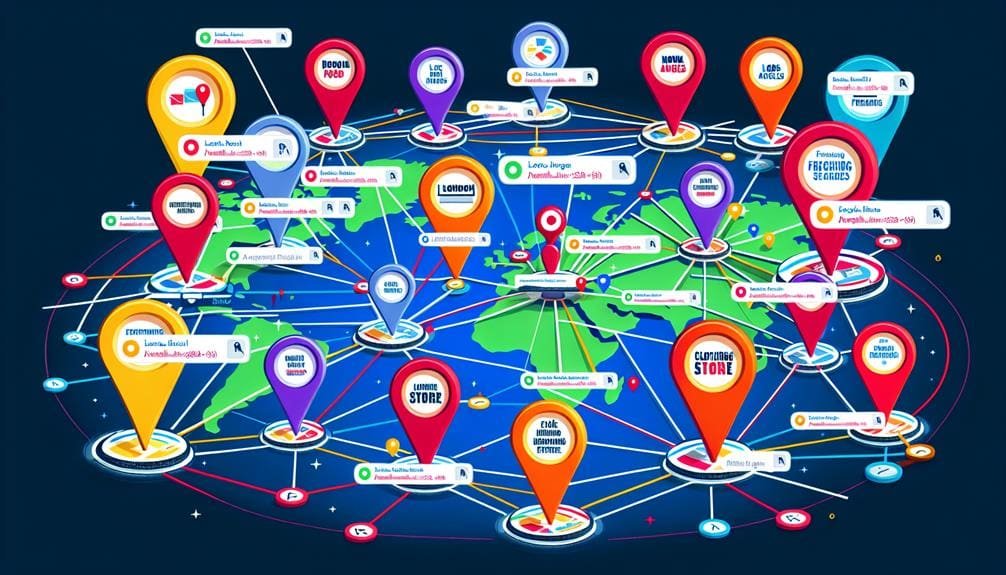Elevate Your SEO With Smart Local Keyword Mapping
Reading Time: 4 minutes When we implemented smart local keyword mapping for our client's website, we saw a significant increase in their visibility within the local search results. By strategically aligning specific keywords with relevant pages, we were able to enhance their site structure and content, ultimately leading to higher rankings in local SERPs. However, this was just the beginning of the impact that local keyword mapping had on their SEO. There are additional advanced techniques and tools that can further elevate your local keyword strategy, and I'm excited to share how you can implement these to maximize your SEO efforts. Understanding Local Keyword Mapping In our journey to understand local keyword mapping, we'll start by delving into the fundamental principles that underpin this crucial SEO strategy. Local keyword mapping is a vital component of any comprehensive search engine optimization (SEO) strategy, especially for businesses aiming to enhance their visibility in Google search results for specific geographical locations. By conducting thorough keyword research and strategically assigning target keywords to relevant website pages, local keyword mapping helps in optimizing the site structure and content to attract organic traffic from the target location. Understanding the keyword difficulty and search intent for local searches is essential in this process. This approach not only prevents keyword cannibalization but also identifies content gaps, ensuring that the website grows in a sustainable manner. As digital marketing professionals, mastering the art of local keyword mapping allows us to provide a tailored user experience, delivering content that precisely meets the needs of our local audience. Leveraging SEO keyword mapping tools like SEMrush, Ahrefs, and Google Keyword Planner can significantly streamline the entire process, making it more efficient and effective. Importance of Local Keyword Research Exploring the significance of local keyword research reveals valuable insights that drive targeted visibility and engagement with local audiences. Local keyword research is a vital component of an effective SEO strategy, enabling businesses to understand the specific terms and phrases local audiences use when conducting online searches. This understanding allows businesses to tailor their content and website structure to align with the search intent of local users, increasing the likelihood of appearing in relevant search results. Leveraging local keywords not only helps businesses target potential customers in specific geographic locations but also enhances their visibility in local search results, ultimately leading to higher website traffic and conversions from local searchers. Advanced Techniques for Keyword Mapping Having grasped the significance of local keyword research in enhancing targeted visibility and engagement with local audiences, we are now poised to explore advanced techniques for keyword mapping that optimize site structure and content for high rankings in search engine results pages (SERPs). Here are four advanced techniques for keyword mapping: Utilize advanced keyword research tools: Leverage tools such as Semrush's Keyword Manager to streamline the process of creating keyword clusters and identifying relevant keywords for your target audience. Identify and fill content gaps: Use the keyword map to identify relevant pages that lack optimization for specific target keywords. By addressing content gaps, you can enhance the overall relevance and authority of your website. Implement an effective keyword mapping template: Develop a comprehensive keyword mapping template that outlines target keywords for each page, ensuring a strategic and organized approach to on-page SEO. Optimize internal linking structure: Leverage the keyword map to prioritize efforts for internal links, ensuring that relevant pages are interconnected to maximize the visibility and authority of key pages. Leveraging Local SEO Tools We can enhance our local SEO strategy by leveraging powerful tools tailored for local search optimization. When it comes to local keyword mapping, leveraging local SEO tools is essential for driving more traffic to our target audience. These tools enable us to conduct in-depth keyword research, identify relevant keywords, and optimize meta descriptions for local searches. By using tools specifically designed for local SEO, we can ensure that our website ranks higher in local search results, ultimately reaching our intended local audience. One key benefit of leveraging local SEO tools is the ability to avoid keyword cannibalization, a common issue in SEO where multiple pages compete for the same keyword. These tools provide insights into keyword usage across our website, helping us to strategically allocate keywords and avoid cannibalization. Additionally, they can provide valuable data on 'People Also Ask' queries, enabling us to create content that directly addresses the questions our local audience is asking. Implementing Local Keyword Strategies To effectively implement local keyword strategies, we can draw on the insights gained from leveraging local SEO tools, ensuring that our website effectively targets location-specific keywords and optimizes content for local search intent. When implementing local keyword strategies, it's essential to start with comprehensive keyword research to identify location-specific search terms relevant to our business and audience. Once the relevant keywords are identified, they should be strategically mapped to specific pages on our website to align with local search intent. This involves grouping keywords and ensuring that each page targets specific local keywords, enhancing its visibility in local search results. Additionally, it's crucial to analyze related searches and incorporate them into our content to capture a wider range of local search queries. By focusing on the main keyword and incorporating related searches, we can improve our website's relevance and visibility for local searches, ultimately boosting our local SEO performance and attracting more relevant traffic from our target geographic area. Frequently Asked QuestionsHow to Do Keyword Mapping Seo? We do keyword mapping for SEO by conducting advanced keyword research, optimizing for local keywords, structuring our map, using long tail strategies, analyzing competitors, and employing mapping tools. Our best practices cater to e-commerce and small businesses. How Can I Improve My Local SEO Ranking? To improve our local SEO ranking, we focus on local SEO tactics, optimizing local listings, effective keyword research, geo targeted content, and analyzing local keyword data. By understanding local search trends and ranking factors, we enhance local search visibility. What Are Local SEO Keywords? Local SEO keywords are specific to a particular location, crucial for ranking
















